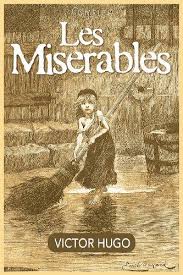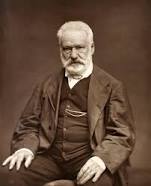Les Misérables Page #7
Les Misérables is a French historical novel by Victor Hugo, first published in 1862, that is considered one of the greatest novels of the 19th century. In the English-speaking world, the novel is usually referred to by its original French title.
After supper he conversed for half an hour with Mademoiselle Baptistine and Madame Magloire; then he retired to his own room and set to writing, sometimes on loose sheets, and again on the margin of some folio. He was a man of letters and rather learned. He left behind him five or six very curious manuscripts; among others, a dissertation on this verse in Genesis, In the beginning, the spirit of God floated upon the waters. With this verse he compares three texts: the Arabic verse which says, The winds of God blew; Flavius Josephus who says, A wind from above was precipitated upon the earth; and finally, the Chaldaic paraphrase of Onkelos, which renders it, A wind coming from God blew upon the face of the waters. In another dissertation, he examines the theological works of Hugo, Bishop of Ptolemaïs, great-grand-uncle to the writer of this book, and establishes the fact, that to this bishop must be attributed the divers little works published during the last century, under the pseudonym of Barleycourt. Sometimes, in the midst of his reading, no matter what the book might be which he had in his hand, he would suddenly fall into a profound meditation, whence he only emerged to write a few lines on the pages of the volume itself. These lines have often no connection whatever with the book which contains them. We now have under our eyes a note written by him on the margin of a quarto entitled Correspondence of Lord Germain with Generals Clinton, Cornwallis, and the Admirals on the American station. Versailles, Poinçot, book-seller; and Paris, Pissot, bookseller, Quai des Augustins. Here is the note:-- "Oh, you who are! "Ecclesiastes calls you the All-powerful; the Maccabees call you the Creator; the Epistle to the Ephesians calls you liberty; Baruch calls you Immensity; the Psalms call you Wisdom and Truth; John calls you Light; the Books of Kings call you Lord; Exodus calls you Providence; Leviticus, Sanctity; Esdras, Justice; the creation calls you God; man calls you Father; but Solomon calls you Compassion, and that is the most beautiful of all your names." Toward nine o'clock in the evening the two women retired and betook themselves to their chambers on the first floor, leaving him alone until morning on the ground floor. It is necessary that we should, in this place, give an exact idea of the dwelling of the Bishop of D---- CHAPTER VI--WHO GUARDED HIS HOUSE FOR HIM The house in which he lived consisted, as we have said, of a ground floor, and one story above; three rooms on the ground floor, three chambers on the first, and an attic above. Behind the house was a garden, a quarter of an acre in extent. The two women occupied the first floor; the Bishop was lodged below. The first room, opening on the street, served him as dining-room, the second was his bedroom, and the third his oratory. There was no exit possible from this oratory, except by passing through the bedroom, nor from the bedroom, without passing through the dining-room. At the end of the suite, in the oratory, there was a detached alcove with a bed, for use in cases of hospitality. The Bishop offered this bed to country curates whom business or the requirements of their parishes brought to D---- The pharmacy of the hospital, a small building which had been added to the house, and abutted on the garden, had been transformed into a kitchen and cellar. In addition to this, there was in the garden a stable, which had formerly been the kitchen of the hospital, and in which the Bishop kept two cows. No matter what the quantity of milk they gave, he invariably sent half of it every morning to the sick people in the hospital. "I am paying my tithes," he said. His bedroom was tolerably large, and rather difficult to warm in bad weather. As wood is extremely dear at D----, he hit upon the idea of having a compartment of boards constructed in the cow-shed. Here he passed his evenings during seasons of severe cold: he called it his winter salon. In this winter salon, as in the dining-room, there was no other furniture than a square table in white wood, and four straw-seated chairs. In addition to this the dining-room was ornamented with an antique sideboard, painted pink, in water colors. Out of a similar sideboard, properly draped with white napery and imitation lace, the Bishop had constructed the altar which decorated his oratory. His wealthy penitents and the sainted women of D---- had more than once assessed themselves to raise the money for a new altar for Monseigneur's oratory; on each occasion he had taken the money and had given it to the poor. "The most beautiful of altars," he said, "is the soul of an unhappy creature consoled and thanking God." In his oratory there were two straw prie-Dieu, and there was an arm-chair, also in straw, in his bedroom. When, by chance, he received seven or eight persons at one time, the prefect, or the general, or the staff of the regiment in garrison, or several pupils from the little seminary, the chairs had to be fetched from the winter salon in the stable, the prie-Dieu from the oratory, and the arm-chair from the bedroom: in this way as many as eleven chairs could be collected for the visitors. A room was dismantled for each new guest. It sometimes happened that there were twelve in the party; the Bishop then relieved the embarrassment of the situation by standing in front of the chimney if it was winter, or by strolling in the garden if it was summer. There was still another chair in the detached alcove, but the straw was half gone from it, and it had but three legs, so that it was of service only when propped against the wall. Mademoiselle Baptistine had also in her own room a very large easy-chair of wood, which had formerly been gilded, and which was covered with flowered pekin; but they had been obliged to hoist this bergère up to the first story through the window, as the staircase was too narrow; it could not, therefore, be reckoned among the possibilities in the way of furniture. Mademoiselle Baptistine's ambition had been to be able to purchase a set of drawing-room furniture in yellow Utrecht velvet, stamped with a rose pattern, and with mahogany in swan's neck style, with a sofa. But this would have cost five hundred francs at least, and in view of the fact that she had only been able to lay by forty-two francs and ten sous for this purpose in the course of five years, she had ended by renouncing the idea. However, who is there who has attained his ideal? Nothing is more easy to present to the imagination than the Bishop's bedchamber. A glazed door opened on the garden; opposite this was the bed,--a hospital bed of iron, with a canopy of green serge; in the shadow of the bed, behind a curtain, were the utensils of the toilet, which still betrayed the elegant habits of the man of the world: there were two doors, one near the chimney, opening into the oratory; the other near the bookcase, opening into the dining-room. The bookcase was a large cupboard with glass doors filled with books; the chimney was of wood painted to represent marble, and habitually without fire. In the chimney stood a pair of firedogs of iron, ornamented above with two garlanded vases, and flutings which had formerly been silvered with silver leaf, which was a sort of episcopal luxury; above the chimney-piece hung a crucifix of copper, with the silver worn off, fixed on a background of threadbare velvet in a wooden frame from which the gilding had fallen; near the glass door a large table with an inkstand, loaded with a confusion of papers and with huge volumes; before the table an arm-chair of straw; in front of the bed a prie-Dieu, borrowed from the oratory.
Translation
Translate and read this book in other languages:
Select another language:
- - Select -
- 简体中文 (Chinese - Simplified)
- 繁體中文 (Chinese - Traditional)
- Español (Spanish)
- Esperanto (Esperanto)
- 日本語 (Japanese)
- Português (Portuguese)
- Deutsch (German)
- العربية (Arabic)
- Français (French)
- Русский (Russian)
- ಕನ್ನಡ (Kannada)
- 한국어 (Korean)
- עברית (Hebrew)
- Gaeilge (Irish)
- Українська (Ukrainian)
- اردو (Urdu)
- Magyar (Hungarian)
- मानक हिन्दी (Hindi)
- Indonesia (Indonesian)
- Italiano (Italian)
- தமிழ் (Tamil)
- Türkçe (Turkish)
- తెలుగు (Telugu)
- ภาษาไทย (Thai)
- Tiếng Việt (Vietnamese)
- Čeština (Czech)
- Polski (Polish)
- Bahasa Indonesia (Indonesian)
- Românește (Romanian)
- Nederlands (Dutch)
- Ελληνικά (Greek)
- Latinum (Latin)
- Svenska (Swedish)
- Dansk (Danish)
- Suomi (Finnish)
- فارسی (Persian)
- ייִדיש (Yiddish)
- հայերեն (Armenian)
- Norsk (Norwegian)
- English (English)
Citation
Use the citation below to add this book to your bibliography:
Style:MLAChicagoAPA
"Les Misérables Books." Literature.com. STANDS4 LLC, 2025. Web. 6 Feb. 2025. <https://www.literature.com/book/les_mis%C3%A9rables_13>.








Discuss this Les Misérables book with the community:
Report Comment
We're doing our best to make sure our content is useful, accurate and safe.
If by any chance you spot an inappropriate comment while navigating through our website please use this form to let us know, and we'll take care of it shortly.
Attachment
You need to be logged in to favorite.
Log In